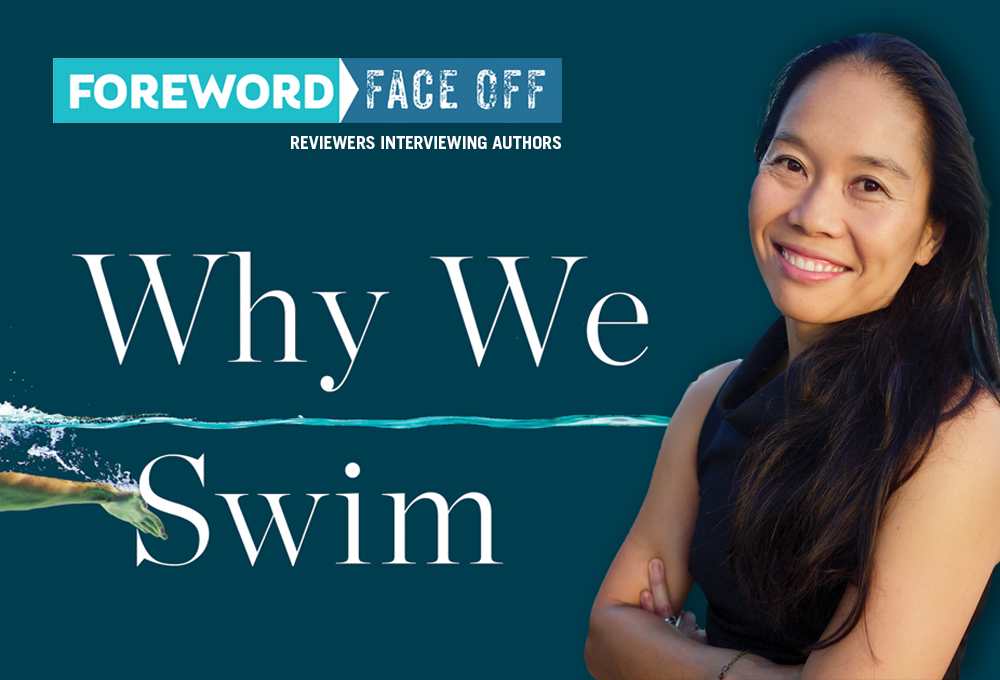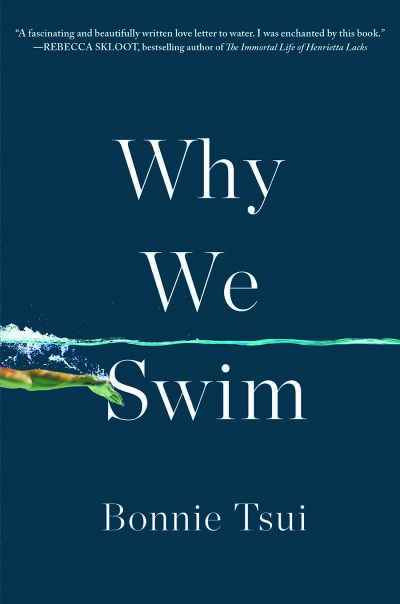Reviewer Matt Sutherland Interviews Why We Swim Author, Bonnie Tsui

Remember those carefree days of splashing and dog paddling in the pools and lakes of your childhood? How the liddle-bit chilly, gradually deepening water excited you, but also earned your respect because mom didn’t want you to go too far from shore?
And then, as if by magic, you learned to swim like the older kids and one of life’s great rites of passage was bested. Let’s never forget the joy of those days. That child is still in you. Soon enough, virus be damned, we’ll all be back in the water.

This week, we’re here with Bonnie Tsui, the author of Why We Swim, an eye-opening “celebration of the many varieties of joy that swimming brings to our oxygen-breathing species,” in the words of Matt Sutherland, in his review for the March/April issue of Foreword Reviews. Bonnie says that we swim “to understand ourselves, that lost, quiet state of just being—no technology, no beeps—dating back to our watery human origins,” and we thought our corona-addled minds could use a watery diversion so we connected Bonnie and Matt for this playful conversation, with the help of Algonquin Books.
Put your goggles on, Matt, and get this pool party started.
First of all, as an avid runner and tennis player, I need to clarify something. How the hell can swimming be the best form of exercise?
Studies show that people stick with swimming the most because it’s so enjoyable! It just feels good. And it’s more forgiving on your joints, so longevity is possible.
Full blown aquaphobia isn’t all that common, but it seems just about everyone has a fear of drowning and sharks. Even so, people love to swim. Is danger part of the allure of swimming?
I think danger is part of the appeal of swimming for some people—to swim in open water is to accept the unknown. You don’t know what animals are swimming out there with you, or exactly what the water conditions will be from one moment to the next. You confront those fears, and realize you are capable of dealing with them. You relinquish some of the control that you’re accustomed to in the rest of your life. That can be freeing.
Setting aside insane swimmers like Lewis Pugh, who swam across the geographic North Pole in 29 degree water temps in a Speedo, cold water swimming is believed by many to have health benefits. Can you talk about the theory and science and anecdotal evidence behind the idea?
You don’t have to get into extreme cold water to feel those benefits! Getting into a regular swimming pool—typically kept at 80 degrees and below—has been shown to stimulate mobility and circulation, without pain, for arthritis patients. It has the same effect for you and me.
Please update us on some of the latest outrageous cold water feats of swimming?
My favorite one of late has been the rage for winter ice swimming competitions around the world. The Israeli ice swimmer Ram Barkai has an amazing account of swimming in Siberia in a lane cut into the ice, and of a woman swimming breaststroke who had to swim with her eyes closed because her eyelashes had frozen together. It’s in the book.
Every year, approximately 372,000 people die from drowning, but more distressingly, you report on the fact that black children are five times more likely to drown than white children. How can that be explained and what can be done to correct the injustice?
This boils down to the history of racism in this country. The pool access that was denied to blacks mid-century has a terrible legacy that persists today, with a lag in access to swimming education. We can boost that access by offering free swim education more broadly in all communities, and especially with outreach to communities of color where parents might not be able to afford lessons. Swimming lessons and pool access is expensive, even for families of means and the time to make it happen.
I was riveted by the story of Guðlaugur Friðþórsson, the Icelander who survived a shipwreck and spent six hours in 41 degree water. What makes his tale so remarkable?
He was able to survive the extraordinarily cold water—it turns out that his body fat resembles that of a seal’s, in that it is two to three times the normal human thickness, and more solid—and he was also able to swim in extraordinarily challenging conditions in the dark over six kilometers to get back to shore. He’s just an extraordinary human, in every sense of the word. And a very kind and resilient soul.
With the Navy SEALS in mind, it was interesting to read about how the ancient Egyptians, Greeks, and Romans viewed swimming as a military skill. Can you talk specifically about war and swimming, and why the great powers of the ancient world championed the ability?
Well, it’s like having an amphibious branch of your military: versatile enough to protect your interests on both land and sea. Especially in ancient times, when the technology wasn’t so advanced and the empires relied more heavily on humans themselves, their bodies, to do the fighting and protection. Many empires could be vulnerable from the coast, and if you had soldiers who could defend from the water, so much the better.
Breath work is a major component of meditation and other mindfulness practices, as well as swimming. Is there a correlation between the two?
Absolutely. Think about breathing while swimming—you take a big breath, hold it, and exhale it slowly. Then you start all over again. There’s a calming and regular rhythm to that, and it encourages a meditative state. It also encourages you to pay attention to your breath, and to how your body is moving through water, so it makes you feel very present.
Lastly, tell us about your own swimming routine and how it impacts your life, your writing, your joie de vivre?
I usually swim three or four days a week in my favorite community pool, and I surf the other days of the week. These days the pools are closed, but the ocean is still open for business. I’m grateful for that..
Matt Sutherland
